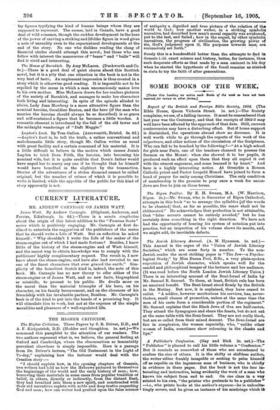The Higher Criticism. Three Papers by S. R. Driver, D.D.,
and A. F. Kirkpatrick, D.D. (Hodder and Stoughton. Is. net.)—We commend this pamphlet to the attention of our readers. The two authors represent what is, we believe, the general feeling at Oxford and Cambridge, where the obscurantism so lamentably prevalent elsewhere is simply impossible. Here is a passage from Dr. Driver's lecture, "The Old Testament in the Light of To-day," explaining how the lecturer would deal with the Creation story :— "I should explain how, in the opening chapters of Genesis, two writers had told us how the Hebrews pictured to themselves the beginnings of the world and the early history of man; how, borrowing• their materials in some cases from popular tradition or . belief, in others, directly or indirectly, from the distant East, they had breathed into them a new spirit, and constructed with their aid narratives replete with noble and deep truths respecting God and man; how one writer had grafted upon the false science
of antiquity a ditfied and true picture of the relation of the world to God ; ow another writer, in a striking symbolic narrative, had described how man's moral capacity was awakened, put to the test, and failed ; how in the sequel, by other syinbolie narratives, the progress of civilisation, the growing pi:fifer of sin, God's judgment upon it, His purposes towards man; are successively set forth." .
Surely this is a hundredfold better than the attempts to find in Genesis is iii. exact science and history, better, for instance, than such desperate efforts as that made by a man eminent in his day
when he started the hypothesis of the fossil remains as created in statu to try the faith of after generations.










































 Previous page
Previous page